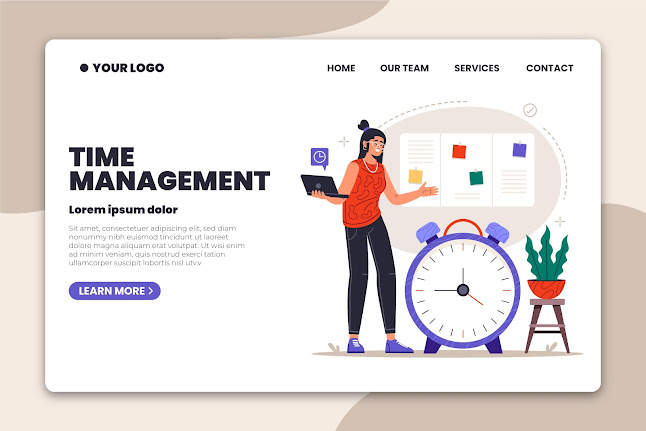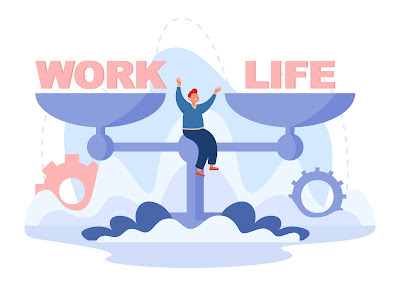Work-Life Balance Ideas for Busy Professionals
Introduction In today's fast-paced world, finding the right balance between work and personal life can be a challenge for many busy professionals. With the pressure to meet work deadlines and perform well in our careers, it can be easy to neglect other aspects of our lives such as family, hobbies, and personal well-being. However, maintaining a good work-life balance is crucial for our physical and mental health, relationships, and overall happiness. In this article, we will discuss some practical work-life balance ideas for busy professionals to help them achieve their goals and lead a fulfilling life.

The Importance of Work-Life Balance for Busy Professionals Maintaining a good work-life balance has numerous benefits for busy professionals, including:
2.Setting boundaries
Creating clear boundaries between work and personal life is essential for maintaining a good work-life balance. Some effective strategies for setting boundaries include:
Introduction In today's fast-paced world, finding the right balance between work and personal life can be a challenge for many busy professionals. With the pressure to meet work deadlines and perform well in our careers, it can be easy to neglect other aspects of our lives such as family, hobbies, and personal well-being. However, maintaining a good work-life balance is crucial for our physical and mental health, relationships, and overall happiness. In this article, we will discuss some practical work-life balance ideas for busy professionals to help them achieve their goals and lead a fulfilling life.

The Importance of Work-Life Balance for Busy Professionals Maintaining a good work-life balance has numerous benefits for busy professionals, including:
Reduced stress levels: A good work-life balance can help reduce stress levels and prevent burnout, which can negatively impact our health and productivity.
Improved physical health: Regular exercise, healthy eating, and getting enough rest are essential components of a healthy work-life balance, which can prevent chronic diseases such as obesity, heart disease, and diabetes.
Better mental health: Taking time to pursue hobbies, spending time with loved ones, and engaging in self-care practices can help reduce stress and improve mental health.
For Resources, Tools, and Apps to Achieving Life Balance in your personal and professional life click here
Increased productivity: A good work-life balance can boost productivity by reducing stress levels, increasing focus, and improving overall well-being.
Enhanced relationships: Maintaining a good work-life balance can help improve relationships with family, friends, and colleagues, and help us develop stronger connections.

Challenges of Work-Life Balance for Busy Professionals Achieving a good work-life balance can be challenging for many busy professionals. Some common challenges include:Long working hours: Many professionals work long hours, leaving little time for personal life activities.
High-pressure work environment: High-stress jobs can make it difficult to maintain a good work-life balance.
Difficulty in disconnecting from work: With the rise of technology and remote work, it can be challenging to disconnect from work and create boundaries.
Limited time for personal life: With work demands taking up a lot of time, it can be challenging to find time for hobbies, family, and self-care.
Lack of support from employers: Some employers do not prioritize work-life balance, making it challenging for employees to achieve a good balance.
Work-Life Balance Strategies for Busy Professionals

1.Time management techniques
Time management is crucial for maintaining a good work-life balance. Some effective time management techniques for busy professionals include:
Check out our blog post on "The Ultimate Guide to Maintaining Good Health: Tips and Tricks for a Happier, Healthier Life"
Check out our blog post on "Prioritizing Health: The Importance of Adopting a Healthy Lifestyle, Eating a Balanced Diet, Regular Exercise, and Getting Enough Sleep"
Improved physical health: Regular exercise, healthy eating, and getting enough rest are essential components of a healthy work-life balance, which can prevent chronic diseases such as obesity, heart disease, and diabetes.
Better mental health: Taking time to pursue hobbies, spending time with loved ones, and engaging in self-care practices can help reduce stress and improve mental health.
For Resources, Tools, and Apps to Achieving Life Balance in your personal and professional life click here
Increased productivity: A good work-life balance can boost productivity by reducing stress levels, increasing focus, and improving overall well-being.
Enhanced relationships: Maintaining a good work-life balance can help improve relationships with family, friends, and colleagues, and help us develop stronger connections.

Challenges of Work-Life Balance for Busy Professionals Achieving a good work-life balance can be challenging for many busy professionals. Some common challenges include:Long working hours: Many professionals work long hours, leaving little time for personal life activities.
High-pressure work environment: High-stress jobs can make it difficult to maintain a good work-life balance.
Difficulty in disconnecting from work: With the rise of technology and remote work, it can be challenging to disconnect from work and create boundaries.
Limited time for personal life: With work demands taking up a lot of time, it can be challenging to find time for hobbies, family, and self-care.
Lack of support from employers: Some employers do not prioritize work-life balance, making it challenging for employees to achieve a good balance.
Work-Life Balance Strategies for Busy Professionals

1.Time management techniques
Time management is crucial for maintaining a good work-life balance. Some effective time management techniques for busy professionals include:
- Prioritization: Prioritize tasks based on their importance and urgency.
- Scheduling: Use a planner or calendar to schedule tasks and events.
- Time tracking: Use time-tracking apps to monitor how much time is spent on each task.
Check out our blog post on "The Ultimate Guide to Maintaining Good Health: Tips and Tricks for a Happier, Healthier Life"
Check out our blog post on "Prioritizing Health: The Importance of Adopting a Healthy Lifestyle, Eating a Balanced Diet, Regular Exercise, and Getting Enough Sleep"
Struggling to maintain work-life balance? Check out The Ultimate Guide to Achieving Work-Life Balance!
2.Setting boundaries
Creating clear boundaries between work and personal life is essential for maintaining a good work-life balance. Some effective strategies for setting boundaries include:
- Establishing clear work hours: Set specific work hours and avoid working outside those hours.
- Avoiding after-hours communication: Turn off work-related notifications outside of work hours.
- Communicating boundaries with colleagues and family: Let colleagues and family members know your boundaries and ask for their support in maintaining them.
3.Self-care practices
Engaging in self-care practices is essential for maintaining a good work-life balance. Some effective self-care practices include:

4.Delegation and outsourcing
Delegating tasks and outsourcing can help busy professionals save time and reduce stress. Some effective delegation and outsourcing strategies include:
Employers are increasingly offering flexible work arrangements to help employees achieve a better work-life balance. Some effective flexible work arrangements include:
Taking time off and vacations is essential for maintaining a good work-life balance. Some effective strategies for taking time off and vacations include:

Conclusion Achieving a good work-life balance can be challenging for busy professionals, but it is essential for our physical and mental well-being, relationships, and overall happiness. By implementing the strategies outlined in this article, busy professionals can find a better balance between their work and personal lives and lead a more fulfilling life. Remember to prioritize time management, set boundaries, engage in self-care practices, delegate tasks, consider flexible work arrangements, and take time off when needed.
Engaging in self-care practices is essential for maintaining a good work-life balance. Some effective self-care practices include:
- Exercise: Regular exercise can help reduce stress levels and improve overall health.
- Meditation and mindfulness: Meditation and mindfulness practices can help reduce stress and improve mental well-being.
- Hobbies and leisure activities: Engage in hobbies and leisure activities to reduce stress and improve overall well-being.

4.Delegation and outsourcing
Delegating tasks and outsourcing can help busy professionals save time and reduce stress. Some effective delegation and outsourcing strategies include:
- Delegating tasks to colleagues or employees: Identify tasks that can be delegated to colleagues or employees, and ensure they have the necessary training and resources to complete them.
- Outsourcing tasks: Consider outsourcing tasks such as administrative work, bookkeeping, or social media management to free up time for more important tasks.
Employers are increasingly offering flexible work arrangements to help employees achieve a better work-life balance. Some effective flexible work arrangements include:
- Remote work: Working remotely can eliminate the stress of commuting and allow for a better work-life balance.
- Flexible schedules: Flexible schedules, such as compressed workweeks or flextime, can allow employees to work when they are most productive and fit personal activities into their schedules.
Taking time off and vacations is essential for maintaining a good work-life balance. Some effective strategies for taking time off and vacations include:
- Planning ahead: Plan vacations and time off in advance to ensure work deadlines and responsibilities are taken care of.
- Disconnecting during vacations: Take a complete break from work during vacations and avoid checking work-related emails or phone calls.

Conclusion Achieving a good work-life balance can be challenging for busy professionals, but it is essential for our physical and mental well-being, relationships, and overall happiness. By implementing the strategies outlined in this article, busy professionals can find a better balance between their work and personal lives and lead a more fulfilling life. Remember to prioritize time management, set boundaries, engage in self-care practices, delegate tasks, consider flexible work arrangements, and take time off when needed.








Comments
Post a Comment